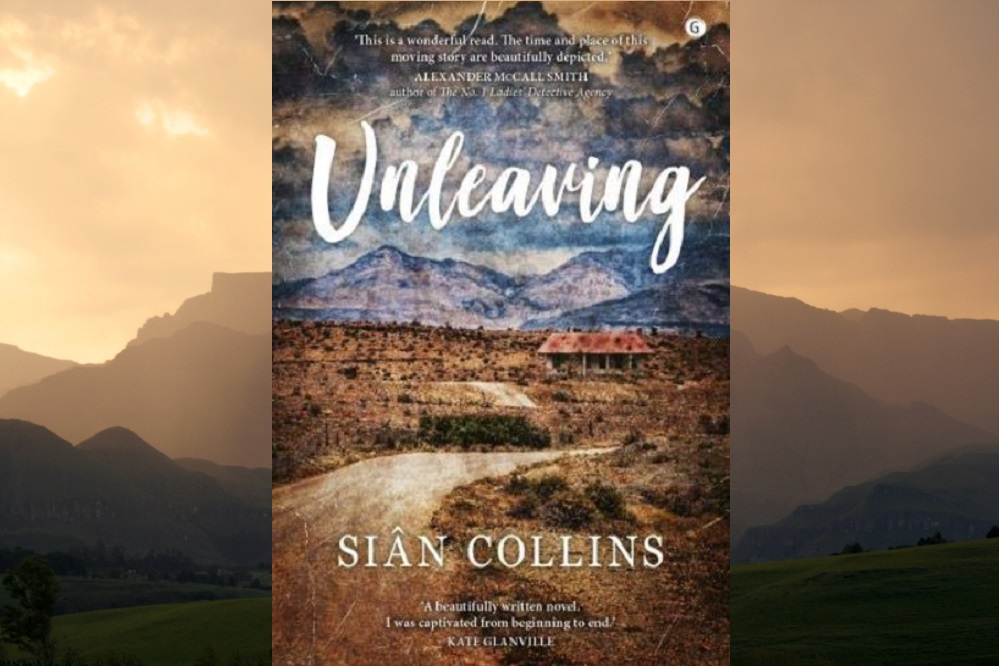Review: Unleaving is a book of quiet mysteries and forbidding new terrain

Jon Gower
This is a novel of uprootings and transplanting, concentrating in the main on the tale of Margaret Lewis who exchanges the green, rain-sodden landscape of her home in the Towy valley for the baked earth of South African grasslands.
Her family is still dealing with the death of her brother in the killing fields of the First World War but is also saddled with a burden of debt, so an unexpected legacy finds then upping sticks to a run-down farmstead called Thorneybrook at the base of the Drakensbery mountains. So by the winter of 1920 young Margaret finds herself on board a train crossing the Natal province, seeing a landscape unroll before her which is very different from that of her native, leafy Carmarthenshire.
Beyond the train a vast landscape opened out: hills unfolding as far as the eye could see, the earth still felted with the ochres and yellows of winter grass, dissolving into the distance into the brown smoke haze of a hundred small fires. She had never seen anything like it. Winter at home was always green.
Running a farm in a different and harsher climate was inevitably going to be a challenge but the death of Margaret’s father makes it almost an impossibility. Luckily one of the men who had been a friend of hers growing up, William Hughes offers to come out to work at Thorneybrook and thereby escape the mundanity of his job in a colliery office. By dint of his hard graft and compassionate way of working with some native workers – this is, after all, an apartheid South Africa where men and women are far from equal – they manage to make a fist of it. Margaret’s mother even manages to cultivate a small fruit garden and when their possessions are moved into the various rooms of the farm it begins to resemble a home.
But herein lies a mystery. They don’t know who moved the furniture into place and this is just the beginning of a chain of weird events that serve to befuddle Margaret. Notes are left by seemingly spectral visitors, strange faces appear at windows at night. Then parcels appear, such as one which contains the poetry of Emily Dickinson, along with a cryptic message.
Margaret finds herself playing detective with a range of clues, which appear as anything from the inscription on a gravestone to garish paintings that appear on the walls when her back is turned or when she is away on business. As she puts it, her life begins to resemble something out of ‘Terrifying Tales at Midnight.’
Testing
Just to make things worse Margaret also has to deal with the haughty and disdainful presence of Percival Flynn, a solicitor entrusted with running the farm’s accounts and generally keeping an eye on things. He is clearly up to no good and he is joined in his schemings by a one-eyed woman called Mary, who lives on a nearby estate and is bored enough to crave any sort of adventure, even one involving the duplicitous Flynn.
To say this is good old fashioned storytelling is to be in no way demeaning of Sîan Collins’ novel – quite the opposite. The plotting is sure-footed and compels the reader to join Margaret on her journey, and to hope she manages to avoid the predations of the scheming lawyer and avoid the puff adders that lie coiled and dangerous about the place. The writing is crisp and clear and never showy or fussy, relying on the simple question “What next?” which is the simplest engine of narrative to keep the pages turning.
It’s a book of quiet mysteries, of disappearing codicils to wills and the testing rigours of settling down in a forbiddingly new terrain. It echoes, quite naturally, such books as Colleen McCullough’s ‘The Thorn Birds’ – which substitutes Ireland for Wales and an Australian sheep station for an African dairy farm – along with Patrick White’s ‘The Tree of Man’ and Laurens Van der Post’s ‘A Story Like the Wind.’
But while these other novels also have ranching and farming at their hearts, Sîan Collins has written a book which is very much her own, with its quiet ghosts and unspoken longings, shot through with vivid blurts of landscape description which constantly play off the comparisons between the green and undulating hills of Carmarthenshire and the parched, tawny grasslands of Natal, between the land of the red kite and one where vultures circle.
Unleaving is published by Gomer, costs £8.99 and can be bought here.
Support our Nation today
For the price of a cup of coffee a month you can help us create an independent, not-for-profit, national news service for the people of Wales, by the people of Wales.






